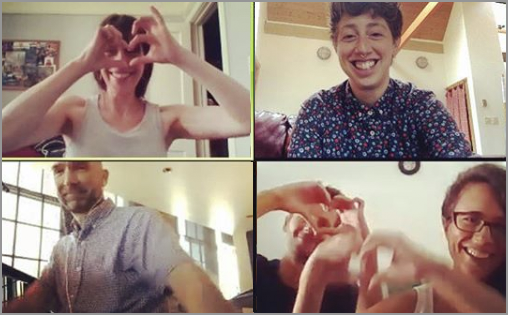Have you ever worried that your multipotentialite journey has stalled? What happens when you take the risk to follow your multipotentialite passions, but the only direction you seem to be headed is nowhere in particular? Can you accept your identity as a multipotentialite before you feel like you have anything to show for it?
These are the questions I tackled in a candid conversation with Puttyverse member Kay Glass. You are invited into an unflinchingly honest conversation about what can be a confusing and disheartening—but ultimately rewarding—process: coming to accept your multipotentialite self exactly as you are.
With a focus on spiritual consultation, writing, knitting, lending trauma support, baking, and blogging her journey, Kay lives by her handle name: @iamaprocess. No matter what her day job, Kay is on a mission to help others heal through getting clear about where they’ve been and getting excited about the journey that lies ahead.
In our conversation, Kay sheds light on her process of accepting her identity as a multipotentialite: What life was like before she found the concept of multipotentiality, what changed when she did, and what advice she has for multipotentialites who are still struggling to find their place in the world.
Life before the word “multipotentialite”
Trouble blending in
“For a long time, I used to blame who I was on my environment,” Kay said. Her family moved every 6-10 months, and she went to a new school every year. Kay had to “learn how to be a million different people in a million different places.” Like me, she felt misunderstood and “frustrated about trying to explain myself or the way I move through the world.” At each new school, Kay learned how to make herself appear smaller, slower, and less complicated so that others wouldn’t feel threatened by the number of interests, projects, and ideas constantly brewing in her mind.
Mislabeled and misunderstood
Kay’s friends and family had many names to describe how she appeared to them: vagabond, “the granola,” and Jane of All Trades… “Or they would say: ‘She’s our free spirit – she’s a wild child. She’s our creative.” A classic multipotentialite, Kay was often mislabeled as impulsive. “All of these things that look impulsive to them have actually been in your brain, marinating, for like six months. And nothing’s impulsive! It has just been something that you haven’t talked about until you were ready.” It was frustrating when others didn’t see what Kay called “the backstory”—all the thinking, learning, and research that led to the next so-called impulsive action.
A series of unsatisfying jobs
Kay described working at a monotonous job, her “umpteenth job that I had left because it just didn’t feel right anymore.” Like many people, she had reached an ending point with that job during the COVID-19 pandemic. I describe these as my Mary Poppins moments: times when I realize that I’ve contributed in a unique and significant way, and it’s time for me to fly away to my next adventure. In these moments, I know I’ve given others the tools to continue the work I started if they wish, using my multipotentialite gifts.
Ready to be fired—and thankful for it
While my multipotentialite personality means I’m happy to be the one to choose to leave a job, the threat of getting fired at any job would probably scare me into compliance. In contrast, Kay embraced the last time she was fired. “It was so funny. The day they fired me, [when] I woke up, I knew it was going to be that day.” Kay laughs as she tells me about her boss breaking the news that she was being let go: “I started smiling because I was like: Thank you so much for this opportunity. I’m so grateful for this time. Thank you, I will happily accept my severance package. Good day!“
From “survival mode” to paralysis
Life after being fired wasn’t an easy road. Kay did some traveling and worked several more jobs before her partner decided it was time for an intervention. “He sat me down because I was going into survival mode.” She described a relatable multipotentialite quandary: “I didn’t know what to do. I’ve done so many different jobs in my life because I could do them.” Kay pointed out that one of the curses of “being a multipotentialite is that you have the breadth and the ability to do so many things.” Like many of us, Kay was taught to “take something that you love and [have a] passion for, and find a way to make money doing it.” She described thinking, “Ok, cool. Which one of my 20 hobbies should I pursue? You tell me!”
After trying to professionally pursue several of her interests, Kay acknowledged that she was “frozen and paralyzed,” spinning her wheels. She says, “my partner gave me the best gift ever. He told me to just stop moving—stop running around—because I’d been traveling literally every 6-10 months.”
Intentionally seeking stillness
Kay’s transition away from reactive paralysis reminded me of what I have been learning from Dr. Lorna Williams’ seven Lil’wat Principles. Dr. Williams translates the Lil’wat principle of Kat’íl’a as “seeking spaces of stillness and quietness amidst our busyness and quest for knowledge; stop and listen deeply.” When Kay gave herself permission to be still, she found Emilie’s TED Talk. “When I first heard the word multipotentialite, everything in me just calmed down.”
What changed when you finally found a word to describe you?
Finding the Puttyverse community—a place where it’s completely normal to “do a million things, because we can!”—was transformative for Kay. She realized that she didn’t have to walk the multipotentialite path alone. There was a community of people who understood and supported her. Up until then, Kay had been alone on her journey toward self-understanding and self-acceptance. She embraced the Puttyverse community, and they embraced her: “Puttypeeps reviewed and helped me optimize my resume. Puttypeeps encouraged me to even explore career paths never before considered. Puttypeeps gave me a sounding board for the million and one other ideas I had and some I still have floating around in my brain.”
What advice do you have for multipotentialites struggling to find their place in the world?
Embrace your strengths as a leader
Kay used to wonder what made former classmates either call her a “nerd” or “intimidating,” even though she was a friendly, extroverted person. “It took me a long time to realize that they meant mentally. When you’re a multipotentialite, you can run circles around other people when you’re in your field.” She explained that when fast-processing multipotentialites are in a room where the topic is something that they care deeply about, “people think you’re a natural born leader because of how fast you can move. All of a sudden, your brain has considered everybody in the room’s opinions and ideas. You’ve already made a plan to take action…while they’re still figuring out how they feel.”
Show yourself acceptance with your self-talk
“In the past, I spent so much time hating myself, and finding things to hate about myself.” Kay’s journey to self-acceptance began when she started doing the work of “consciously paying attention to how I spoke about myself. You start paying attention to what you’re taking [in], who you’re around, how that influences how you treat yourself. [I looked at] what I was doing on a daily basis to actually appreciate who I was.” She realized that living an authentic life required self-acceptance and appreciation in the present—not in an imagined future. “And so now I have to find things to love about myself. And then, through that, I’m going to start learning what inner acceptance feels like, instead of outside acceptance.” This daily practice led Kay to an unshakeable inner truth. Wherever she found herself in the world, she would never lose herself again.
“I had a complete acceptance of my power, and my ability, and my intelligence as a woman who goes through the world in this way. And I was ready—I was finally ready!—to hear the word multipotentialite and take ownership of that.”
Don’t go it alone
As we wrapped up our conversation, I asked Kay if she had any final advice for our readers. She said she’d like her story to reach, “anyone who’s exploring. Anybody who’s trying to figure out who they are, or part of who they are, or who found something about the multipotentialite mentality or community.” If that resonates with who you think they might be…or be becoming, this is for you.
Her advice? “Nothing great in your life ever happens without support. If you want great things to happen, find support.” As she sees it, big things happen in life when you take the risk to let yourself be truly seen and supported. “You show up to the table with all your stuff, and you dump it out, and you’re like, Sorry guys, let me just make room here! and you dump it all out. Wherever you’re at, however you show up, and whatever you’re passionate about— whatever it is—bring it to the table.”

Kay Glass is currently a nursing student, a blogger, and spiritual mentor for people seeking clarity on their own path in life. You can find Kay on social media @iamaprocess or check out her blog at iamaprocess.com
Your turn
Where are you in your journey to self-acceptance? Has it taken any unexpected twists and turns? What advice can you offer those who are still exploring? Share your thoughts in the comments!

Doing/being/exploring ALL THE THINGS is easier with a community!

Did you know we have a private community of hundreds of multipotentialites from around the world? We support each other, share advice and cheer each other on as we build lives and careers around ALL our passions.
Learn more and join the Puttyverse community here:


I too saw THE TEd talk. It resonated with me and my family. My children are both in their early 20’s and have just finished degrees and both moved out of the house within days of each other. They are in a place in which they could be in their jobs for life but realize they are multipotentialites like their parents and don’t want to stay in one place even if it means economic stability. So they are questioning themselves on what is next. I, myself, am trying to start my own business but I can’t figure out a name which encompasses all that I am and do. I am a musician who plays several instruments: saxophone, piano, ukulele, guitar, flute, tin whistles, accordion. I am a public school teacher. I am a knitter, crocheter and I sew. I teach grade 5 four days a week. I took a 20% leave without pay for health reasons as I have fibromyalgia. I would love to build my small arts and education business on that day off but I need it to manage my chronic illness. However, my plan is to continue working at 80% until I’m 55 then start gradual retirement in which I keep reducing my teaching hours and increasing my small business hours. I have already started teaching private piano and music theory lessons and I have bought four sewing machines to teach sewing. I had my first sewing class for kids last summer and we all loved it. I want to teach from my home and also sell my fashion pieces online. My problem is being stuck on a business name.
Welcome to the community, Anna! I’m glad Emilie’s TED Talk resonated with you too. It sounds like you have a beautiful blend of talents, interests, and ideas. Did you want to share some names that you’re considering?